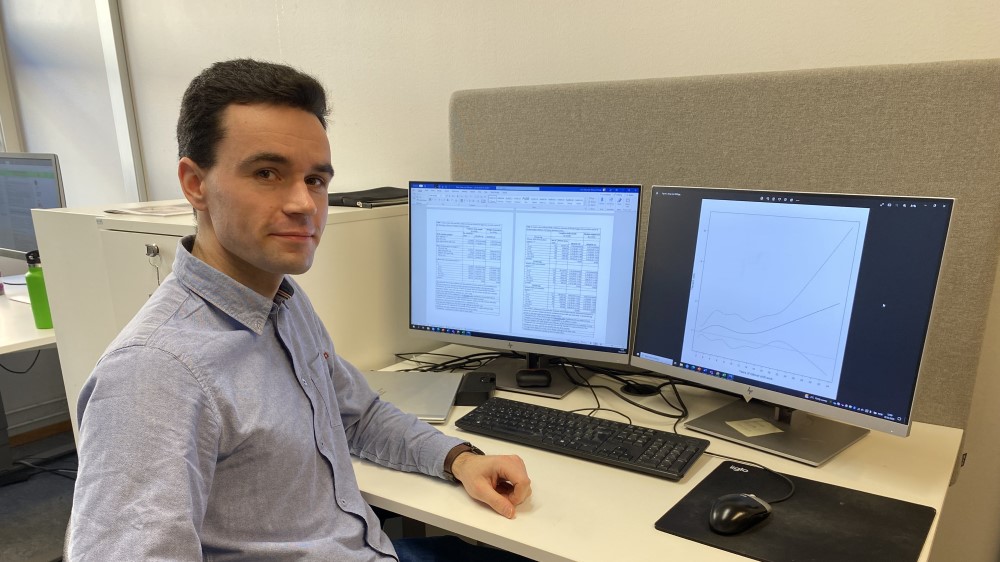After lung cancer, prostate cancer is the second most frequent cancer among men in the world with about 1.4 million new cases every year. In Norway, more than 5,000 men are diagnosed with prostate cancer yearly, making it the most frequent cancer among men in the country. Previous studies have shown that persons working in the Norwegian offshore petroleum industry have a 20 percent higher risk of getting prostate cancer compared to the rest of the Norwegian population.
Researchers at the University of Oslo and the Cancer Registry of Norway wanted to find out whether this increased risk could be linked to working night shifts on oil platforms.
“Of 25,000 male participants in the study, all of whom had worked on oil platforms, 300 were diagnosed with aggressive prostate cancer. We studied offshore petroleum workers who rotated between working night and day shifts, and compared them to those who only worked day shifts. We discovered that the workers who worked rotating shifts had an increased risk of getting aggressive prostate cancer”, says Leon Alexander Mclaren Berge.
Berge is a postdoctoral fellow at the Department of Biostatistics at the University of Oslo and at the Cancer Registry of Norway. Rotating shifts means working seven night shifts, followed immediately by seven day shifts, or vice versa, during the course of each 14-day work period.
“We found that those who had worked for more than 19 years on a rotating shift schedule of this kind had an 86 percent higher risk of getting aggressive prostate cancer compared to those who only worked day shifts. But this estimate must be cautiously interpreted, since there were relatively few cancer cases in this analysis”, explains Berge.
Offshore petroleum workers’ sleep and wake cycles are disrupted on a regular basis
There is still a great deal we do not know about the factors that increases the risk of developing this form of cancer. Researchers believe that old age and the occurrence of previous cases of prostate cancer in multiple family members can be contributory factors. Excess weight, smoking, and exposure to certain chemicals may also play a role.
In this new study, 25,000 men who had worked offshore during one or more periods between 1967 and 1998 filled out an extensive survey giving information about their living habits and professional careers. The participants were monitored through the Cancer Registry of Norway between 1999 and 2019 for potential diagnoses of aggressive prostate cancer.
The researchers believe that the increased risk may be due to negative health effects caused by the regular disruption of the sleep and wake cycle over long periods of time.
“It is often difficult to adapt to light at night. People who work nights often suffer from acute disruption of the sleep and wake cycle, sleep deprivation, increased stress, and a variety of other health problems. When this balance between light and dark is continually disturbed, it may also increase the risk of cancer, as experiments in animals have shown”, explains Berge.
Prostate cancer is likely particularly sensitive to hormones
Berge points out that prostate cancer is believed to be particularly sensitive to hormones and researchers have discovered that people who work nights have low levels of the so-called sleep hormone melatonin.
“This may be important, as animal experiments have consistently shown that melatonin helps to prevent the development of cancer. Sex hormones are also affected by night work and this may contribute to the growth of prostate cancer”.
According to Berge, rotating shift work results in numerous transitions between day and night work and workers may have less time to adjust and adapt to these different cycles.
“Rotating shifts may exacerbate these negative effects, which can partly explain why the risk of developing cancer was shown to be higher amongst workers who had this kind of work schedule”, he says.
Offshore workers should be given fewer and shorter night shifts
Several studies have been carried out on night shift work. Berge points out that researchers have not found a connection between prostate cancer and night shift work in all of these studies. It may depend on the type of work in question and on the times and lengths of the night shifts, he emphasizes.
“A general recommendation could be for workers to do fewer and shorter night shifts and to space their periods of night work further apart. This would reduce how frequently the sleep and wake cycle is disrupted and would give workers more time to stably readjust to a new rhythm”, says Berge.
The study has been published in the International Journal of Epidemiology. It was carried out at the Department of Biostatistics at the University of Oslo and at the Cancer Registry of Norway, in collaboration with researchers at the University of Bergen, the US National Cancer Institute and the Albert Einstein College of Medicine. It was funded by the Research Council of Norway and the Norwegian Cancer Society.
